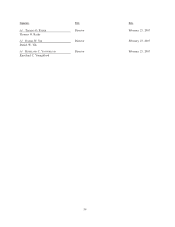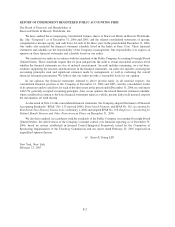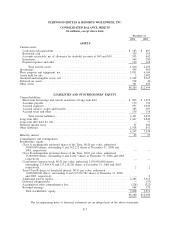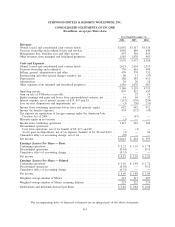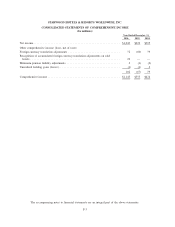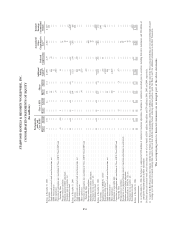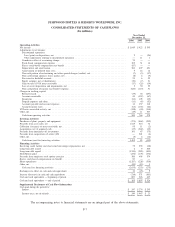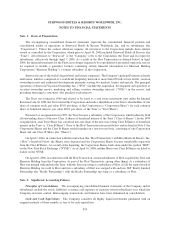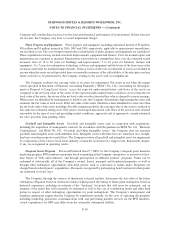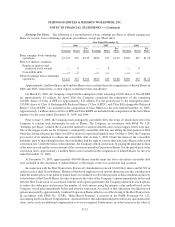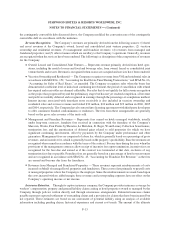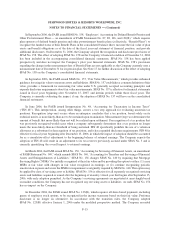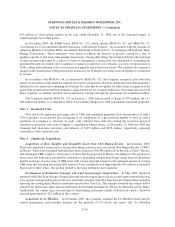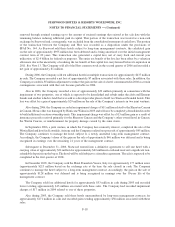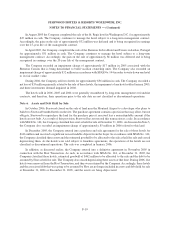Starwood 2006 Annual Report Download - page 71
Download and view the complete annual report
Please find page 71 of the 2006 Starwood annual report below. You can navigate through the pages in the report by either clicking on the pages listed below, or by using the keyword search tool below to find specific information within the annual report.Company will consider these factors as well as forecasted financial performance of its investment. If these forecasts
are not met, the Company may have to record impairment charges.
Plant, Property and Equipment. Plant, property and equipment, including capitalized interest of $5 million,
$10 million and $5 million incurred in 2006, 2005 and 2004, respectively, applicable to major project expenditures,
are recorded at cost. The cost of improvements that extend the life of plant, property and equipment are capitalized.
These capitalized costs may include structural improvements, equipment and fixtures. Costs for normal repairs and
maintenance are expensed as incurred. Depreciation is provided on a straight-line basis over the estimated useful
economic lives of 15 to 40 years for buildings and improvements; 3 to 10 years for furniture, fixtures and
equipment; 3 to 7 years for information technology software and equipment and the lesser of the lease term or the
economic useful life for leasehold improvements. Gains or losses on the sale or retirement of assets are included in
income when the assets are sold provided there is reasonable assurance of the collectibility of the sales price and any
future activities to be performed by the Company relating to the assets sold are insignificant.
The Company evaluates the carrying value of its assets for impairment. For assets in use when the trigger
events specified in Statement of Financial Accounting Standards (“SFAS”) No. 144, “Accounting for the Impair-
ment or Disposal of Long-Lived Assets,” occur, the expected undiscounted future cash flows of the assets are
compared to the net book value of the assets. If the expected undiscounted future cash flows are less than the net
book value of the assets, the excess of the net book value over the estimated fair value is charged to current earnings.
When assets are identified by management as held for sale, the Company discontinues depreciating the assets and
estimates the fair value of such assets. If the fair value of the assets which have been identified for sale is less than
the net book value of the assets including allocable segment goodwill, the carrying value of the assets is reduced to
fair value less estimated selling costs. Fair value is based upon discounted cash flows of the assets at rates deemed
reasonable for the type of asset and prevailing market conditions, appraisals and, if appropriate, current estimated
net sales proceeds from pending offers.
Goodwill and Intangible Assets. Goodwill and intangible assets arise in connection with acquisitions,
including the acquisition of management contracts. In accordance with the guidance in SFAS No. 141, “Business
Combinations,” and SFAS No. 142, “Goodwill and Other Intangible Assets,” the Company does not amortize
goodwill and intangible assets with indefinite lives. Intangible assets with finite lives are amortized on a straight-
line basis over their respective useful lives. The Company reviews all goodwill and intangible assets for impairment
by comparisons of fair value to book value annually, or upon the occurrence of a trigger event. Impairment charges,
if any, are recognized in operating results.
Frequent Guest Program. Starwood Preferred Guest@(“SPG”) is the Company’s frequent guest incentive
marketing program. SPG members earn points based on spending at the Company’s properties, as incentives to first-
time buyers of VOIs and residences, and through participation in affiliated partners’ programs. Points can be
redeemed at substantially all of the Company’s owned, leased, managed and franchised properties as well as
through other redemption opportunities with third parties, such as conversion to airline miles. Properties are
charged based on hotel guests’ expenditures. Revenue is recognized by participating hotels and resorts when points
are redeemed for hotel stays.
The Company, through the services of third-party actuarial analysts, determines the fair value of the future
redemption obligation based on statistical formulas which project the timing of future point redemption based on
historical experience, including an estimate of the “breakage” for points that will never be redeemed, and an
estimate of the points that will eventually be redeemed as well as the cost of reimbursing hotels and other third
parties in respect of other redemption opportunities for point redemptions. The Company’s management and
franchise agreements require that the Company be reimbursed currently for the costs of operating the program,
including marketing, promotion, communications with, and performing member services for the SPG members.
Actual expenditures for SPG may differ from the actuarially determined liability.
F-10
STARWOOD HOTELS & RESORTS WORLDWIDE, INC.
NOTES TO FINANCIAL STATEMENTS — (Continued)


